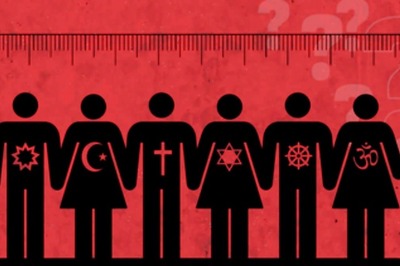
views
TOPEKA, Kan.: Republican legislators in Kansas on Thursday put a proposed anti-abortion amendment to the state constitution on the ballot for the states August 2022 primary election.
The Senate approved the measure 28-11, giving abortion opponents one more vote than the two-thirds majority they needed. The House approved the same measure last week. Approval by a simple majority of voters would change the Kansas Constitution.
The measure would overturn a 2019 Kansas Supreme Court decision that access to abortion is a fundamental right under the states bill of rights. New language would declare that the state constitution doesnt grant the right to abortion and that the Legislature can regulate it in line with U.S. Supreme Court decisions.
The measure would not be an abortion ban, but it would allow lawmakers to enact one if the nations highest court were to overturn its landmark 1973 Roe v. Wade decision protecting abortion rights.
Abortion rights opponents have argued that the amendment would allow the Legislature to regulate abortion as it had before the 2019 decision. They warn that future state court decisions could end almost all restrictions on abortion.
Abortion rights supporters contend that the measure is a big step toward banning abortion.
THIS IS A BREAKING NEWS UPDATE. APs earlier story follows below.
Kansas abortion rights opponents and supporters are so confident that a proposed anti-abortion constitutional amendment will make it onto next year’s primary ballot that they’ve already begun previewing their pitches to voters, including one that suggests such an amendment would hurt the state’s businesses.
Ahead of the state Senate’s planned debate on the measure Thursday, Democratic Gov. Laura Kelly warned that enacting it would lead to boycotts of Kansas and discourage companies from relocating to the state. Kelly, a strong abortion rights supporter, said last year that the proposal would return the state to the Dark Ages.
The measure that would overturn a 2019 Kansas Supreme Court decision that access to abortion is a fundamental right under the states bill of rights. New language would declare that the state constitution doesn’t grant the right to abortion and that the Legislature can regulate it in line with U.S. Supreme Court decisions. The measure would not be an abortion ban, but it would allow lawmakers to enact one if the nation’s highest court were to overturn its landmark 1973 Roe v. Wade decision protecting abortion rights.
There are a number of CEOs who really look to see what kind of inclusive policies we have in place that make it easier for them to recruit and retain a talented work force, Kelly said in a recent Associated Press interview. It will be an economic development issue for us.
Kansas would become at least the seventh state with language in its constitution saying the charter does not grant a right to abortion, and Iowa lawmakers are considering a similar measure.
Republicans hold supermajorities in both Kansas legislative chambers, and the measure won House approval last week by more than the two-thirds majority needed to get it on the ballot. If the Senate approves it unchanged, also with at least a two-thirds majority, the measure will go on the ballot in the state’s August 2020 primary election. Approval by a simple majority of voters statewide would change the constitution.
So far, the biggest obstacle in the Senate has been too many GOP members being absent because of illness or personal reasons. Elections last year not only preserved the Legislature’s GOP supermajorities but made them more conservative.
The people of Kansas have shown they are pro-life, and the election spoke volumes, said Jeanne Gawdun, lobbyist for Kansans for Life, the most influential anti-abortion group in state politics.
Two decades worth of restrictions on abortion have been enacted in Kansas with bipartisan support. Kansas imposes a 24-hour waiting period ahead of an abortion, spells out what information providers must provide patients and requires most minors to notify their parents before terminating a pregnancy.
Abortion opponents expect to argue to voters that the amendment would allow the Legislature to regulate abortion as it had before the 2019 decision and warn of the possibility of unregulated abortion from future court decisions. Abortion rights supporters already are testing a message that the measure is a big step toward an abortion ban.
Kelly likens the anti-abortion measure to North Carolina’s infamous and since-repealed 2016 bathroom law preventing transgender residents from using facilities in line with their gender identities, which prompted an economic backlash. In Kansas in 2014, a House-passed measure to protect people from lawsuits if they refused for religious reasons to provide services to LGBTQ people died in the Senate when some business leaders objected to it.
People are looking on where they want to live, where they want to raise their family, said Senate Minority Leader Dinah Sykes, a Kansas City-area Democrat. It’s not normally a place where they’re trying to take away rights.
Equality Kansas, the state’s leading LGBTQ-rights group, has stayed out of the abortion debate. But its executive director, Tom Witt, said conservative lawmakers and groups behind the measure also have pushed anti-LGBTQ legislation.
I can’t imagine that this would improve matters,” Witt said.
In 2019, Georgia’s enactment of a ban on most abortions, some movie producers and actors said they wouldn’t film in the state, but the major studios were quieter than they were about the North Carolina bathroom law.
And businesses and business groups have been silent so far on the Kansas anti-abortion proposal.
Alan Cobb, president and CEO of the Kansas Chamber of Commerce, said high taxes and burdensome regulations make Kansas less competitive and, “no, the (abortion) amendment will not hurt the states economic development.
Abortion opponents said the lack of public opposition from business leaders suggests Kansas wouldn’t face any economic fallout.
If you’re going to say unlimited abortion is helpful to your economic future, that’s kind of a problem, said Brittany Jones, advocacy director for the anti-abortion Family Policy Alliance of Kansas. You’re essentially saying you want to build your economy on the back of abortion.
___
Follow John Hanna on Twitter: https://twitter.com/apjdhanna
Disclaimer: This post has been auto-published from an agency feed without any modifications to the text and has not been reviewed by an editor
Read all the Latest News, Breaking News and Coronavirus News here




















Comments
0 comment